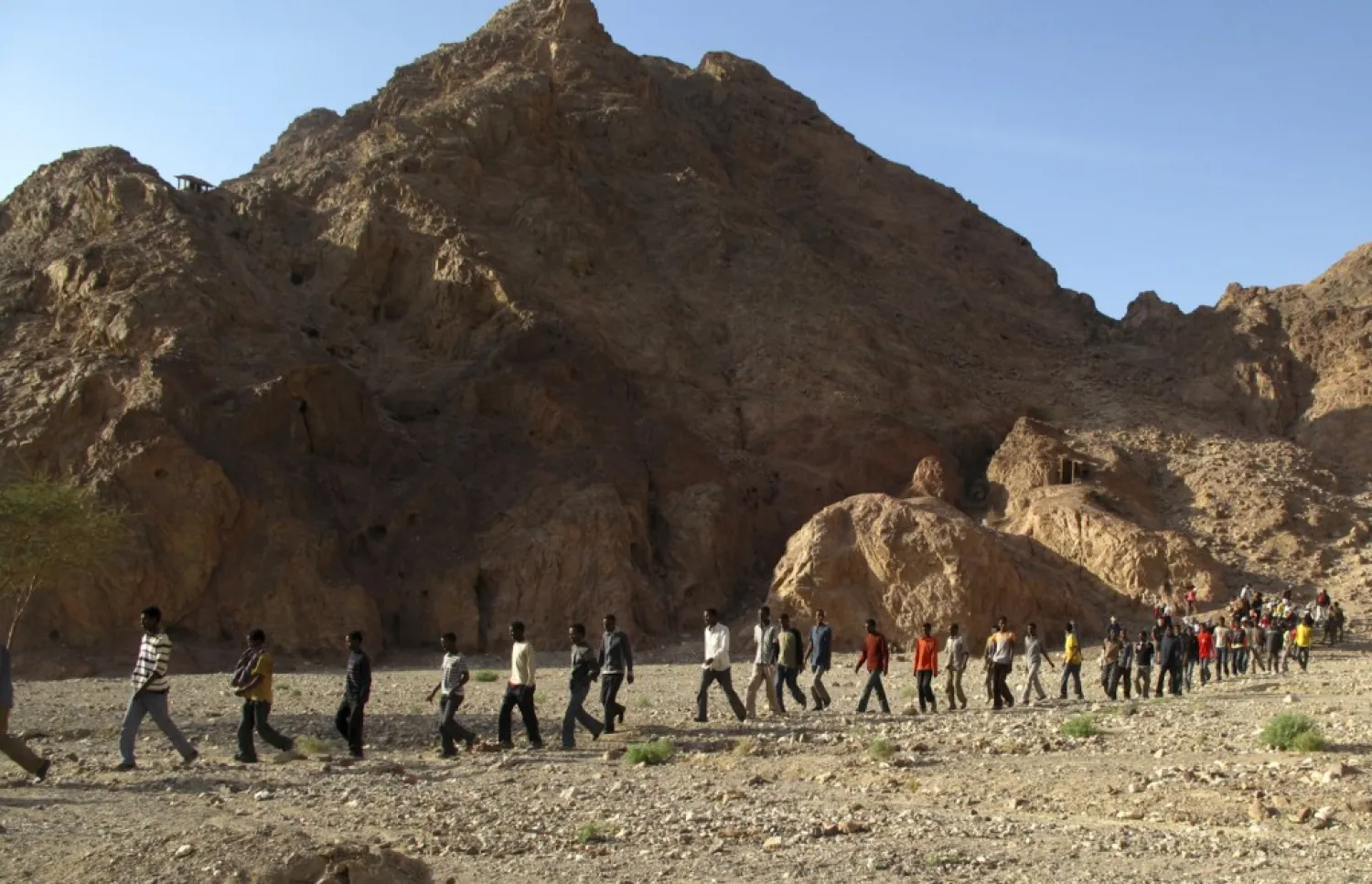As the sun set over the desert, Syrian Ghada Mohammed and other illegal migrants surveyed what food and drink remained after a long trek inside the cramped space of a vehicle that made its way along smuggling routes from Sudan to Egypt.
Ghada tried to regain her strength with the setting sun, but the shortage of water and food, screaming babies and threats of smugglers only dampened her spirits.
Ghada is just another of many migrants who were traversing the desert.
Despite the tightened Egyptian security measures along the vast southern border with Sudan, smugglers continue to thrive along mountainous and desert routes. Some make the long arduous journey, others choose to wait and some die in the desert.
Asharq Al-Awsat toured the migrants who were clamoring to flee to Egypt to escape unrest in Sudan and Syria.
Sudan is the favored destination of Syrian refugees and others from poor African countries. They can enter it without a visa, contrary to other countries that have imposed restrictions against the entry of Syrians, including Egypt. In Sudan, the refugees wait long periods before making the trek north.
In Sudan, they can live without security restrictions from authorities, however, the deterioration of the local currency has forced them to seek better options. Some migrants also opt to quit Sudan over the political upheaval that followed the ouster of President Omar al-Bashir in April. They therefore, choose illegal smuggling routes to Egypt given that local authorities refuse to grant migrant permits.
Syrian Mohammed Abdul Rahman Mohammed, 40, lived in Egypt for more than seven years. Family circumstances after the January 2011 revolt forced him to leave to Sanaa, Yemen to live with his parents. After his father passed away, he moved to Turkey with his mother where he lived in Istanbul for some two years. His mother moved to the United States to join her children, who have been living there for several years. Mohammed then tried several times to return to Egypt, by first submitting a request for an entry permit. His numerous requests were all rejected. He then traveled to Malaysia where he lived for two years and where he again applied for an entry permit to Egypt, but to no avail.
He ultimately resorted to Sudan where he is awaiting to be granted the nationality in order to be able to enter Egypt and remain there permanently after his request to join his family in the US was rejected.
Sudanese are allowed to travel to Egypt without a visa. Some 2 million Sudanese travel to their northern neighbor every year.
Mohammed told Asharq Al-Awsat that smugglers in Sudan charge 300 – 500 dollars per person. The majority of smugglers deceive the migrants and force them to walk on foot for dozens of kilometers in treacherous terrain and amid soaring temperatures.
The journey by car is also dangerous, he remarked, revealing that if a migrant falls off the vehicle, smugglers often just leave them behind in the desert. Moreover, migrants who do make it to Egypt could find themselves in trouble with the law if they are caught, even though authorities occasionally overlook some cases on humanitarian grounds.
According to the United Nations High Commissioner for Refugees, Egypt handled some 280,000 migrants in 2019. The majority were refugees and asylum-seekers from Egypt, Eritrea, South Sudan, Sudan and Yemen. Migrants often hail from South Sudan, Eritrea, Ethiopia, Chad, Somalia, Sudan, the Palestinian territories and Syria, making Egypt one of the major routes to Europe. The agency said Egyptian authorities were providing the necessary care to the refugees and asylum-seekers.
Professor at the American University in Cairo and expert in migrant and refugee affairs, Dr. Amira Mohammed told Asharq Al-Awsat: “Some illegal migrants traverse the desert from Sudan to Egypt in order to reach Europe, however, figures show that migrant operations from Egypt through the Mediterranean were almost nonexistent.”
She explained that the majority of migrants arriving from Sudan come to Cairo to register at the UNHCR.
The Syrian refugee, Ghada, told Asharq Al-Awsat that she headed to Sudan nine months ago with her husband in hope of reaching Europe.
“We first planned on reaching Europe through the countries of the southern Mediterranean. We first thought of heading to Niger, then crossing into Algeria through the Sahara and then making it to Europe. The challenges of the desert forced us to change our minds and we instead thought of traveling to Mauritania and then heading to Algeria, again through the Sahara,” she revealed.
“Ultimately, however, we agreed to flee to Egypt through the desert after reaching a deal with smugglers,” Ghada recalled. Each person paid 250 dollars for the journey. The migrants were packed 15 to a car.
The journey through the desert is dangerous because there are no clear natural features. Many migrants and smugglers alike have lost their way in the vast terrain. Only experienced smugglers could make the trek.
Ghada said the journey from Sudan to Egypt took some 30 hours, during which the migrants suffered nervous, physical and psychological exhaustion. The Sudanese smugglers dropped them off to Egyptian smugglers are a border point. After that, they made a two-hour car journey through the desert to reach the outskirts of Aswan city. There, they were raided by border guards, but managed to flee. Another vehicle in the convoy was not so lucky.
















